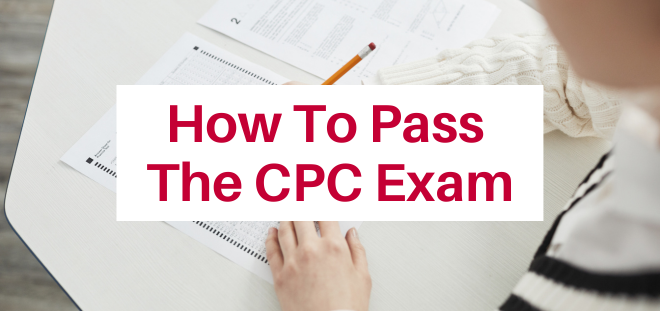This blog post will tell you how to pass the CPC exam. The Certified Professional Coder (CPC) exam, administered by the American Academy of Professional Coders (AAPC), is a highly respected certification in the healthcare industry. Earning your CPC credential opens the door to numerous career opportunities in medical coding. Whether you're an aspiring coder looking to start your career or a seasoned professional seeking to enhance your qualifications, passing the CPC exam is a significant step toward success.
In this comprehensive guide, we will walk you through the essential steps, tips, and strategies to help you prepare for and pass the CPC exam.
Understanding the CPC Exam
Before diving into the preparation process, it's crucial to understand the CPC exam itself. The CPC exam evaluates your knowledge of medical coding, including the ability to assign correct CPT (Current Procedural Terminology) codes, ICD-10-CM (International Classification of Diseases, 10th edition) diagnosis codes, and HCPCS Level II codes. Here are some key points to consider:
- Exam Format: The CPC exam consists of multiple-choice questions and case studies. It is divided into two parts – the first part is a five-hour, 150 multiple-choice questions section, and the second part is an on-site or virtual “code book” portion where you are allowed to use approved code books to answer questions.
- Passing Score: To pass the CPC exam, you must score at least 70%. It's essential to aim for a score higher than this to ensure success.
- Time Management: Time management is critical, especially in the first part of the exam. You'll have approximately two minutes per question. This is why preparation and practice are vital.
Now, let's delve into the steps to help you prepare and pass the CPC exam.
Step 1: Eligibility Requirements to Take the CPC Exam
Before you can take the CPC exam, you must ensure you meet the eligibility requirements set by the AAPC. These requirements typically include:
- A high school diploma or equivalent.
- Completion of a coding training program or equivalent work experience. The AAPC recommends a minimum of one year of coding experience.
- Membership with the AAPC. It's essential to join the organization to access exam resources and receive a member discount on the exam fee.
- Payment of the CPC exam fee can vary depending on your AAPC membership status.
Ensure you've met these requirements before proceeding with your CPC exam preparation.
The first step to prepare yourself for passing the CPC exam is to take a great medical coding course
You can graduate and be career-ready with CareerSteps' Medical Billing program in less than 3 months and most CareerStep students complete their training and earn their certification in 8 months or less.
As a graduate of some Medical Coding and Billing programs, you will receive a voucher that allows you to sit for one AHIMA or AAPC certification exam of your choice. You are eligible to sit for the following exams:
AHIMA
- Certified Coding Associate (CCA)
- Certified Coding Specialist (CCS)
- Certified Coding Specialist-Physician Based (CCS-P)
AAPC
- Certified Professional Coder (CPC)
- Certified Outpatient Coder (COC)
Step 2: Gather Essential Materials to Prepare for the CPC Exam
To prepare effectively for the CPC exam, you'll need a range of materials, including code books, study guides, and practice exams. Here's what you should consider:
Code Books
You must have the current versions of the essential code books for the CPC exam:
- CPT: The AMA's Current Procedural Terminology book is vital for accurately assigning procedure codes.
- ICD-10-CM: The International Classification of Diseases, 10th edition, Clinical Modification book is crucial for assigning diagnosis codes.
- HCPCS Level II: Healthcare Common Procedure Coding System (HCPCS) Level II is essential for Medicare-specific coding.
Make sure you have the most recent editions of these code books because the codes and guidelines can change from year to year.
Study Guides
Invest in reputable study guides designed specifically for the CPC exam. These guides provide a structured approach to the exam material, including tips and practice questions. They can help you focus your study efforts and ensure you cover all the necessary topics.
Online Resources
Consider subscribing to online resources provided by the AAPC or other reputable institutions. These resources may include practice exams, webinars, and forums where you can ask questions and interact with experienced coders.
Step 3: Create a Study Plan
A well-structured study plan is essential for success in the CPC exam. Here's how to create an effective study plan:
Set Clear Goals: Define what you want to achieve and the score you aim to attain on the exam. Having clear goals will help keep you motivated and focused.
Break It Down: Divide your study plan into manageable sections. Allocate time to each code book and focus on specific sections each day or week.
Daily Practice: Dedicate time to daily study and practice. Consistency is key in retaining information.
Mock Exams: Include practice exams in your study plan. Taking mock exams under exam conditions will help you get used to the timing and format of the CPC exam.
Review and Revise: Regularly review what you've learned and revise sections that need improvement.
Use Study Groups: Consider joining or forming a study group with fellow candidates. Discussing and explaining coding concepts can reinforce your understanding.
Step 4: Understand Coding Guidelines and Conventions
A fundamental part of the CPC exam is demonstrating your understanding of coding guidelines and conventions. These include:
- Correct sequencing of codes.
- Proper use of modifiers.
- Understanding bundling and unbundling rules.
- Code assignment based on documentation and medical necessity.
Ensure that you are well-versed in these coding principles and conventions as they will be tested in the CPC exam.
Step 5: Practice, Practice, Practice
The old adage “practice makes perfect” holds true when preparing for the CPC exam. Regular practice not only helps you recall information but also improves your test-taking skills. Here are some ways to practice effectively:
Take Mock Exams: Use practice exams from your study materials or online resources. The AAPC offers practice exams that closely simulate the actual CPC exam experience.
Timed Practice: Set a timer when taking practice exams to get a feel for the time constraints. Remember that time management is critical during the actual exam.
Review Incorrect Answers: After taking a practice exam, thoroughly review the questions you answered incorrectly. Understand why you made mistakes and work on improving your knowledge in those areas.
Analyze Case Studies: The CPC exam often includes case studies that require a deeper understanding of coding principles. Practice analyzing case studies to strengthen your skills in this area.
Step 6: Study Each Code Set Thoroughly
Familiarity with code sets, such as CPT, ICD-10-CM, and HCPCS Level II, is paramount. Take the time to study each set thoroughly:
CPT (Current Procedural Terminology)
- Review the introductory sections, guidelines, and modifiers.
- Pay attention to surgical package rules.
- Practice coding a variety of procedures.
ICD-10-CM (International Classification of Diseases, 10th edition, Clinical Modification)
- Understand the structure of the code set, including the use of chapters and sections.
- Practice assigning diagnosis codes based on documentation.
HCPCS Level II (Healthcare Common Procedure Coding System)
- Focus on the codes related to Medicare and Medicaid, including durable medical equipment (DME) and supplies.
- Understand the use of modifiers and correct coding for specific services and supplies.
Step 7: Stay Informed About Updates
The world of medical coding is dynamic, with frequent changes and updates to code sets and guidelines. To ensure you're prepared for the CPC exam, stay informed about these changes. Consider the following strategies:
- Subscribe to coding newsletters and journals.
- Attend coding workshops and webinars.
- Join online forums and discussion groups to stay connected with the coding community.
- Regularly check the AAPC's website for updates and announcements.
Step 8: Test Day Preparation
As the CPC exam day approaches, here are some tips to ensure you're well-prepared:
Check Your ID and Authorization Letter: Ensure you have a valid government-issued photo ID and the authorization letter sent by the AAPC.
Arrive Early: Arriving early on exam day will help you settle in, complete registration, and reduce stress.
Essential Materials: Don't forget your code books, pens, and a quiet, well-lit place to work.
Stay Calm and Focused: Nervousness is natural, but try to stay calm and focused during the exam. Don't spend too much time on any one question; if you're unsure, make a note and come back later.
Time Management: Manage your time wisely. Start with questions you're confident about to build your momentum, then tackle more challenging ones.
Utilize Your Code Books: In the second part of the CPC exam, when you're allowed to use code books, make sure you are familiar with their layout. Know how to locate codes quickly.
Step 9: Review and Verify Your Answers

Before submitting your exam, take a few moments to review your answers:
- Double-check your bubble sheet for accuracy.
- Ensure you haven't skipped any questions.
- Verify your answers in the code books if you have time.
Step 10: Steps to Take After Completing the CPC Exam
After completing the CPC exam, there are a few steps to take:
Wait for Results: Be patient while you wait for your exam results. The AAPC typically provides results within five to seven days. Check your email for notification.
Appeal Process: If you don't pass the CPC exam, don't be discouraged. You have the option to appeal the results or retake the exam.
Celebrate Your Success: When you pass the CPC exam, celebrate your achievement. You've earned a valuable credential that can open doors to various career opportunities in medical coding.
Tips for Success in the CPC Exam
Passing the CPC exam requires dedication and thorough preparation. Here are some additional tips to increase your chances of success:
1. Study Regularly: Consistency is key. Make studying a daily habit to reinforce your knowledge and understanding of the material.
2. Take Breaks: Don't overwork yourself. Take short, regular breaks during your study sessions to stay fresh and focused.
3. Use Mnemonics and Memory Aids: Create your own mnemonics and memory aids to help you remember complex information, codes, and guidelines.
4. Stay Healthy: Good physical and mental health is crucial for effective learning and test-taking. Get enough sleep, eat well, and manage stress.
5. Don't Cram: Avoid last-minute cramming. A structured study plan is more effective in the long run.
6. Join a Study Group: Engaging in a study group can provide additional perspectives and help clarify any doubts.
7. Keep a Positive Attitude: Maintain a positive attitude and believe in your ability to succeed. Confidence can make a significant difference in your performance.
8. Read Questions Carefully: Pay close attention to the wording of the questions on the exam. Misinterpreting a question can lead to incorrect answers.
9. Manage Time Wisely: During the exam, manage your time efficiently. Don't get stuck on a single question. Move on, and return to it later if needed.
10. Understand the Official Guidelines: Familiarize yourself with the official coding guidelines provided by the AMA and the CMS (Centers for Medicare & Medicaid Services).
Conclusion on How to Pass the CPC Exam
Passing the CPC exam is a significant achievement that can open doors to a rewarding career in medical coding. It's entirely achievable with the right preparation, dedication, and determination. The first step to prepare yourself for passing the CPC exam is to take a great training course.
So, take a deep breath, create a well-structured study plan, practice regularly, and keep a positive attitude. With the right approach, you'll be well on your way to passing the CPC exam and advancing your career in the ever-evolving field of medical coding.
The CPC credential can be your passport to a world of opportunities, and it all begins with your commitment to success in the CPC exam. Good luck!

